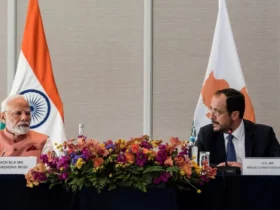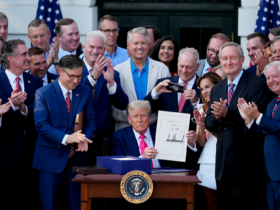By Çetin Dolmaz
“As Australia heads for a general election due by May, Prime Minister Scott Morrison has been positioning himself and his conservative Liberal-National coalition as the tough-on-China camp”, reported Nikkei Asia March 8th 2022.
Australia, which has a bad record of racial discrimination since its establishment, is suffering from the uneasiness and disappointment of its people by adopting a military identity with the partnership it has advanced with the United Kingdom and the United States, although China is its number one trading partner.
Australia, which most of us know as the land of cute koalas and cheerful kangaroos, and whose name has been frequently in the news in recent years due to huge forest fires and floods, was called New South Wales as a British colony with the arrival of British colonists in 1770. The gigantic continent, which was named the Federal State of Australia with the unification of 6 colonies in 1901, now hosts a population of nearly 26 million who came from more than 160 countries.
In the struggle that lasted until the middle of the 20th century between the Aborigines (Australian natives) who lived on the island for 50 thousand years before the arrival of the colonists and whose population approached one and a half million until the arrival of the British, and the colonists, the Anglo-Saxons took over the country completely owned by the natives and committed a systematic assimilation and even genocide. Therefore, their population has decreased to 450 thousand today. Especially between 1788 and 1900, the natives lost about 90 percent of their population as a result of the diseases and attacks they were exposed to.
In the statements made by Pauline Hanson as a senator in the late 1990s, what she said about Asians and Aborigines was at the top of the agenda in the country, so racism, which had been disappearing for many years, came back to the agenda of the country and steps were taken to normalize racism. Today, negative examples of how these seeds planted in the 90s sprout continue to come one after another. So much so that hate crime is rarely prosecuted in Australia. For example, while only three people have been convicted so far in the state of Queensland, no one has been convicted in New South Wales or South Australia since those states passed laws against certain types of defamation in 1994 and 1996 respectively. (1)
People who have migrated to different continents from the Asian continent, which the West has claimed to be the source of Sars and Mers epidemics that have emerged in recent years, are humiliated, insulted and even physically abused by communities influenced by this propaganda in the countries where they have established their new lives. Asians, whose salaries are underpaid, who are considered second-class citizens, are discriminated because of their skin color or country of origin, and even because of their religious beliefs. When the Covid-19 pandemic appeared in 2019, US President Donald Trump persistently used the definition of the “Chinese Virus” and further increased the pressure on Asian people.
Immediately after the racist incidents in the USA were reported in the international press, examples of dramatic and systematic discrimination started to be heard again in Australia, where 16 percent of the population considers itself Asian and more than 5 percent Chinese. It all went so far that according to studies, 46 percent of the population says that the biggest problem of the country is racism.
With their number reaching 1.2 million, Chinese origin citizens are known throughout the country as fair, reliable, disciplined, hardworking, quiet, dislikes causing trouble, not easy to assimilate, but productive and loyal to the countries they live in. They pay their taxes, go to their schools, but they don’t stray too far from their own culture. However, with the recently increasing intergovernmental tensions, there have been a number of discrimination complaints from Chinese-Australian citizens living here that need to be taken seriously. 90 percent of those who participated in the surveys and experienced discriminatory experiences reported that they did not complain to official institutions. However, a new study from the Australian National University (ANU) found out that 84.5 percent of Asian Australians reported at least one case of discrimination between January and October 2020.
“Although I was born in Melbourne, discrimination because of my ethnicity has been a big part of my life,” said Jieh-Yung Lo, director of the Center for Asia-Australian Leadership at the Australian National University. I have faced overt racism because of this, I have been dealing with unconscious biases at work and in recent years my commitment to Australia has been questioned.”(2)
In the human rights report of Amnesty International’s Human Rights Barometer, 84 percent of Australians believe in freedom from discrimination, and 78 percent believe in freedom of religion and culture. Almost two-thirds (64%) of respondents said that Australia is a successful multicultural society, while half (47%) of respondents believed there was a problem with racism, and more than a quarter thought there was no problem with racism. Worryingly, 63 percent of respondents say they believe certain ethnic groups and cultures do not want to conform to the “Australian” lifestyle.
Throughout the Covid-19 pandemic, Asian Australians have faced serious and growing instances of racism. In February 2020, when the pandemic escalated, anti-Asian racism saw a spike, with the Australian Human Rights Commission receiving the largest number of racial discrimination complaints per month. Similarly, 500 cases of ‘anti-Asian racism’ were reported to the Asia-Australia Alliance, with almost 60 percent of these racist incidents involving physical or verbal abuse, most of these racist attacks occur in public spaces. In an anti-Asian hate case, an international student from Hong Kong was punched for wearing a mask. Racial abuse and discrimination against Asian Australians has worsened amid the pandemic, exposing pre-existing racist feelings in many communities. (3)
In Australia, which is known to be in the Western league not only with its political discourse but also institutionally, it is getting harder to say that the media fulfills its responsibility in directing the public against racism. In fact, recent research shows that some key actors in this field, such as the now US-based News Corp publications, founded by Rupert Murdoch, consistently represent certain groups negatively through their racist opinion articles. (e.g. Muslim, Chinese and Indigenous people) (4)
One of the findings in the human rights reports of the Australian government is as follows; “Some groups experience racism at higher rates. Aborigines and those from culturally diverse backgrounds often have to deal with systematic forms of discrimination. Such experiences limit the access of members of these groups to the opportunities and resources available to many of Anglo-Australian descent. Immigrants and refugees are regularly exposed to racism, especially those who have recently arrived. Media reports and comments that use negative stereotypes about refugees and immigrants can fuel prejudice against these groups in the wider community.”
A survey by the Challenging Racism Project found that 20 percent of Australians have faced racial discrimination in the form of hate speech, and about 5 percent have been attacked because of their race. According to the Scanlon Foundation’s 2016 Mapping Social Cohesion survey, 20 percent of Australians have experienced racial or religious discrimination in the past 12 months. One out of every five people. (5) A survey conducted by the Lowy Institute in late 2020 found that nearly 1 in 5 Chinese Australians reported being threatened or attacked in the past 12 months. (6)
Grace, a 22-year-old Chinese-Australian, who didn’t give her last name because she feared further racist backlash, said there was a difference in the way some Australians responded to victims of the coronavirus outbreak compared to the bushfire crisis: “During fires, it should be a social response to the suffering of both people and animals,” said Grace. “We’ve seen overflows of emotion, love, and grief in the media. But here I realized that it doesn’t matter if people like me suffer, and maybe even should be pleased, I’m not as precious to these people as an animal.” (7)
On the other hand, due to the upcoming general elections in Australia, Australia’s hardened statements and preferences against China increase the fears of racism and tension. The costs of the results of Prime Minister Morrison’s heavy criticism towards Beijing regarding the Ukraine crisis are being questioned. As Australia went into election campaign mode, Morrison had harshly criticized China for its “apparent unwillingness to put pressure on Russia over the invasion of Ukraine”, despite Beijing’s offering of mediation. The Ukraine crisis also became a focus, with Morrison accusing China of giving Vladimir Putin a “lifeline” by liberalizing trade after the invasion. Defense Minister Peter Dutton said it was “deeply disturbing that China is essentially promoting Russia”. Last month, the prime minister told parliament that the Chinese government had “chosen its horse” in the election, citing Labor and opposition leader Anthony Albanese. In February, Chinese political candidate Jason Yat-sen Li, a candidate from the centre-left Labor Party, stated that he was racially abused because of the government’s stance.
In the survey released the previous Sunday, Australians perceived China as “the most pressing national security threat, while another survey said the current government would be better at dealing with the issue than the Labor Party.” In one of the latest surveys published by Australia’s national broadcaster The Australian, it is determined that the Labor Party maintains the leadership with a ratio of 55 to 45 percent compared to the current coalition on a bipartisan preference basis. “The elections could be really interesting,” said Juliet Pietsch, a political scientist at Griffith University, who said “anti-Chinese rhetoric has some voters shifting to the Labor Party.” (8)
Years of distrust and allegations of political interference in the Chinese government peaked in 2020 after Morrison called for an investigation into the origins of Covid-19. Morrison formed the AUKUS alliance with the US and UK and positioned against China by gaining access to nuclear submarine technology and announced plans to build a nuclear submarine base. Yet China remains Australia’s number one trading partner in goods and services, accounting for around a third of Australia’s trade. Whatever the outcome, experts say this election could have significant implications for the future of the Australia-China relationship.
As a result, the fact that populist politicians who build their politics on racial inequality still find a place in contemporary politics after all the lessons learned so far, deepens the question marks about when this bleeding wound of discrimination in the world will heal. However, it should not be difficult to predict that China, which has a 5000-year-old civilization heritage and whose borders are still unchanged, will not suffer as much as Australia from this showdown.
The first anti-Chinese law in Australia was passed during the ‘gold rush’ of 1855. Since the 1850s, the immigration of Chinese immigrants to Australia caused a great reaction in the country and racist reactions against Asian immigrants increased. While the ideas of ‘White Australia’ and ‘Australian belongs to Australians’ rose in the 1870s, in 1901 the White Australian policy – a series of bipartisan legislative measures – was adopted to preserve racial and cultural homogeneity. On the one hand, the governments in the country are feeding the fears against Asians. On the other, this situation has become a foreign policy problem especially against China. It took until 1973 to eliminate the last remnants of the White Australia policy.
- https://www.abc.net.au/news/2019-05-05/why-are-so-few-hate-crimes/11078972
- https://www.abc.net.au/news/2020-11-02/asian-australians-suffer-covid-19-discrimination-anu-survey/12834324
- https://www.amnesty.org.au/does-australia-have-a-racism-problem-in-2021/
- ATN, 2020; check www.alltogethernow.org.au/media-monitoring/) CRIS – Issues Papers – Racism in Australia: filling data gaps / ISSN 2653-0147 (Online) No. 1 2021 / Website: crisconsortium.org
- https://humanrights.gov.au/our-work/education/who-experiences-racism
- https://asia.nikkei.com/Politics/International-relations/Australia-s-tough-on-China-election-stirs-fears-of-racism-tensions
- https://www.sbs.com.au/news/article/this-is-racism-chinese-australians-say-theyve-faced-increased-hostility-since-the-coronavirus-outbreak-began/kapo2xszw?_x_tr_sl=en&_x_tr_tl=tr&_x_tr_hl=tr&_x_tr_pto=sc
- https://asia.nikkei.com/Politics/International-relations/Australia-s-tough-on-China-election-stirs-fears-of-racism-tensions

















Leave a Reply